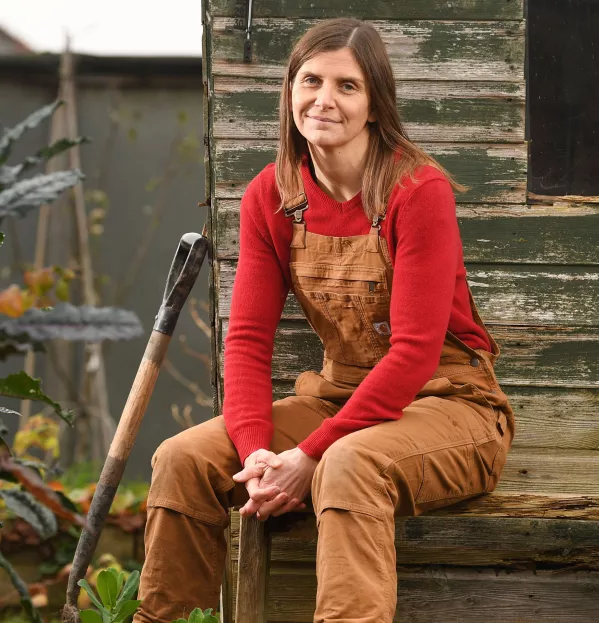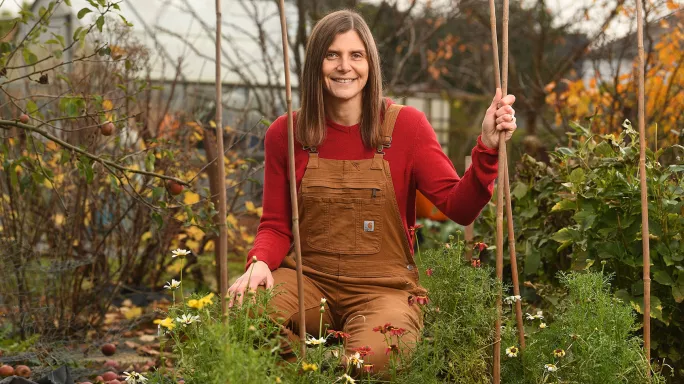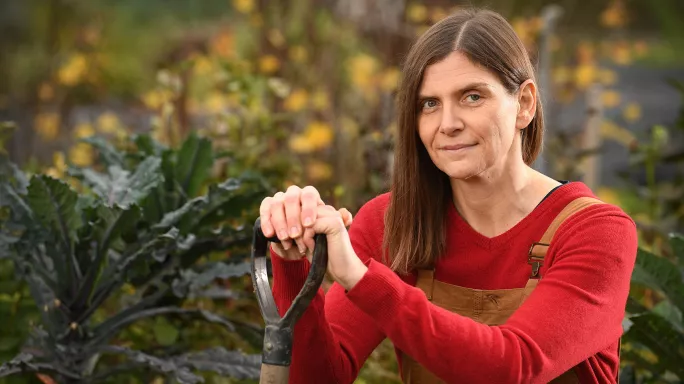10 questions with...Melanie Renowden

Melanie Renowden is chief executive officer of the National Institute of Teaching, which was launched last year as the government’s “flagship teacher training and development provider”.
The institute is run by four multi-academy trusts - collectively known as the School-Led Development Trust (SLDT) - comprising Harris Federation, Outwood Grange Academies Trust, Oasis Community Learning and Star Academies. Renowden was previously an executive director at Star Academies.
She spoke to Tes about the importance of opportunities at school and about the “superhuman contribution” of the workforce.
1. Who was your most memorable teacher and why?
One is Mr Day, who was my Year 6 teacher at primary school. I think what made him so memorable was how his classroom felt, and it really felt like a place of exploration where you could test your potential - it just felt great to be in his classroom.
And then the other thing I remember really vividly from then is the books that we read. I can remember reading a book called I am David, about a boy who grows up in a concentration camp. I think I always had been a keen reader, but with a standard childhood diet of the Enid Blytons and Roald Dahls. Mr Day opened us up to this world of literature with a new landscape and different, more challenging themes. So I really remember that.
And then the other one I wanted to mention is Ms Turley, who was my maths teacher for GCSEs at secondary school. I think the reason she stands out in my mind is because I really think it was in her classes that I kind of got won over by the wonder of maths, which I really felt in her class. And she had a brilliant way of explaining. She was just such a good teacher. So by the time she finished with me, I loved maths, and I still do.
2. What were the best and worst aspects of school?
So I was very lucky and had a really happy, enjoyable time at school. I was thinking of all the opportunities there were when I was at school, so sports and clubs and drama - and I did all the school plays and all of that. I just grabbed all of that with both hands, and schools are so good at that stuff. And since I’ve been working at Star, I’ve just been wowed all over again by the opportunities that schools make sure they’re giving to children.
- More 10 questions: Sir Peter Lampl, founder of the Sutton Trust
- Hilary Spencer, CEO of Ambition Institute
- Emma Hollis, NASBTT executive director
I moved primary schools when I was 9, when we moved from Shropshire to Sussex. So I didn’t know anyone when I started in Year 5. I have a very vivid memory of standing in line in the playground, with my Mr Men lunchbox, standing on my own, just feeling completely like a fish out of water. And I think it was probably slightly compounded by the fact that I had quite a strong Shropshire accent, which I don’t have any more, which I think was probably a reaction to “well, that needs to go so that I can integrate better into the school”.
That is quite a hard thing for children, lifting them out of the environment they’re used to and dropping them into a completely new one. But I was very lucky because the school handled it brilliantly and, actually, in no time at all it felt like home and like I’d been there for a long time.
3. Why do you work in education?
It is the direct line to children, for me, and also the potential to do work that delivers social good. That’s what gets me out of bed in the morning: it’s the thing that nourishes my soul and I do feel really lucky to have the opportunity to work in education, where you can say that, and where I feel I’m proud of the work that I do. And I feel proud when I tell my children what I do for a living because I think it’s so important.
When I first worked in education, which was 25 years ago, I worked at the Teacher Training Agency, which was sort of a government department. When I was there, I used to sometimes just stop and marvel at the opportunity I’d had and what a privilege it was to get to work on something that was so important to society.
And so in the intervening 25 years in the different parts of the education system that I’ve worked -and in trustee positions and governance positions and the kind of voluntary positions I’ve had as well - I’ve always felt that sense of privilege and opportunity and how important it is for me personally to feel like I’m doing something that delivers benefit to society.
I think the other reason why I stay working in education is getting to spend time and work with such amazing teachers at schools.

4. What are you proudest of in your career and what do you regret?
In 2011 I recruited a group of middle leaders in the North West on to a middle leadership programme called Teaching Leaders.
It was, at that time, just in London, and I joined to bring the Teaching Leaders programme to the North West. I recruited 40 middle leaders from schools that were serving disadvantaged communities across the North West, and I’m so proud of that group. They made a massive personal commitment by taking the plunge to get involved in the programme. They took a bit of a risk with a new approach to professional learning, and amongst them there are many headteachers that are working in schools across the North West who are doing incredible things.
School leaders are a phenomenal group and their impact has been enormous, and I learned so much from them along the way, from working with them as well. So that’s a real source of pride because we were doing something a bit different in recognising the importance of middle leadership in schools.
I regret that I didn’t do more to get closer to schools in the first few roles in my career. I was working with and for the Department for Education on teacher recruitment and development in the late 1990s and early 2000s, and it was the norm to do so from offices in Westminster without really engaging directly with schools all that much at all. I was surrounded by really excellent people from whom I learned a huge amount, but I think we were too accepting of our distance from the day-to-day reality of schools, rather than really appreciating the value we would have gained from getting out and visiting schools and meeting teachers and seeing children and young people in the classroom.
Being in schools, speaking with those who work in schools, being immersed in schools - this sits at the heart of our work at the National Institute of Teaching. We are building the organisation, and delivering our work, with that at the front of our minds - and very consciously doing things structurally and culturally to eliminate the “reality penalty” that can stop good intent from delivering in-school impact.
5. What do you think are the best and worst aspects of our school system?
It’s all about what happens in the classrooms, but if I think beyond that, I think that the roles that schools play centrally in their communities are so powerful - particularly over the last couple of years and in the context of the pandemic particularly.
Schools saying, “We want and need to support our pupils, their families and the wider community,” and schools doing things like setting up food banks overnight and doing food delivery services for vulnerable members of the local community in the pandemic. And staff volunteering and acting as hubs and wraparound services and things. The power of schools as a kind of beacon in their local communities, I think, is incredible.
If I continue that thread, the role that schools play can be a challenge when it comes to resources. Schools being part of what is in effect a kind of complex local ecosystem of public services. To have really healthy schools you need to have all parts of that ecosystem being healthy, so that I think can be a challenge.
I feel like there needs to be more acknowledgment of that kind of thinking at that ecosystem level.
6. What will our schools be like in 30 years’ time?
I think broadly our schools will look and feel largely as they do now, but there’s still more we can do to grow and mobilise the evidence base on what works in education. The [DfE-funded education research charity] Education Endowment Foundation has been a force for good for the past decade and I think we’ll collectively continue to build on that strong start.
In practice, I hope and believe that that will mean a pervasive culture of enquiry, with teachers and leaders being able to make choices about the approaches they are taking based on a sound understanding of what works.
There’s very important work here for the NIoT, too, in building understanding about effective teacher development in ways that can easily be applied in schools. At its very simplest, that means always being able to answer the question “why do we do this this way?” before proceeding.
7. Your own teachers aside, who has influenced you the most?
The first is Baroness Campbell [former PE teacher and sports charity leader Sue Campbell], who I saw speak at an event 10 years ago. She wowed me so much with the candour in which she talked about her own career journey, and then about how she behaved and the cultures that she built as a leader, that I then accosted her in the cloakroom queue. This was at the time when I was starting work with middle dealers, and I said to her, “You’re amazing - please can you come and talk to the middle leaders that we’re working with?” For five years, she came and spoke at the residential that we ran every summer for middle leaders, and I think the power she has is the honesty and humility with which she talks about her own time as a teacher.
Then also Leora Cruddas, the CEO at the Confederation of School Trusts. I think the contribution she’s making to the sector is really immense and I think the quiet, intelligent, moral leadership that she embodies; well, I just observe her with awed scholarship all the time. And she’s also made me think again about poetry. She often uses poems as a kind of framework for messages that she’s wanting to deliver. Having been extremely apathetic towards poetry my entire life, she has made me actually read some poetry.
The third one is my sister, who is a secondary science teacher. She is my go-to for a daily reality check on what life is like in schools. That is absolutely invaluable, because it can be very easy in the world in which we’re working to fall into caricatures or assumptions and make those mistakes.
So she’s my quick fact-checker and healthy dose of reality.

8. If you became education secretary tomorrow, what would you change?
I think I would want to make it really really clear, through words and deeds, that the quality of education starts and ends with people. And I just want that to be my overarching message that permeates through all the policy and outputs and department funding decisions.
The reason I say that is, what I see through my interactions through schools is a thinking about education quality and school improvement as being separate from people and staff development.
At times, people and the development of people become a footnote or are not sufficiently foregrounded in conversations about the quality of education, as though these things are different, and they are the same thing.
So I would want to make that my central theme, I think, and I would also want to do more to help parents to understand that as well. Because I think that that message probably is not widely known or understood, actually, by parents: about how critical teacher development is to the quality of education that their children experience.
9. Who’s made the biggest difference to education in the past 12 months?
The thing that I am reminded of over and over again is actually the workforce: everybody who is involved in education doing amazing things day in, day out. And so I think there’s a danger of saying, “There is this group of people who make a superhuman contribution,” whereas actually the superhuman contribution is made by the whole complex web of people who are working on this. And while it is tempting to think that you’ve found the superstars, actually we haven’t at all.
So there’s a small group of people that often quite rightly are known and identified and celebrated and who are doing amazing work, but there are so many more of them that we don’t know and aren’t celebrating. And so I think it’s about all the people whose names we don’t know.
10. What is the most important lesson you’ve learned in the job?
So, three things here. One is about listening to as many voices as possible, and how it can be really easy to be fooled into thinking that quite a narrow slice of voices, or those that are the loudest, are representative. And so I think you’ve got to really work hard to listen to as many different views as possible. And I honestly think the more you are tempted to run away from challenge, the more you should be tempted to open yourself up to it.
It’s quite complacent to assume that your personal network gives you access to the infinite variety of what goes on in schools and school experience. Actually, that kind of learning about and understanding schools, that work is never done. That is something that’s foundational to the way we’re looking at the National Institute.
The other one is to keep asking “why?”: it’s that sense of curiosity and wanting to be intentional about what we’re doing.
You need a Tes subscription to read this article
Subscribe now to read this article and get other subscriber-only content:
- Unlimited access to all Tes magazine content
- Exclusive subscriber-only stories
- Award-winning email newsletters
Already a subscriber? Log in
You need a subscription to read this article
Subscribe now to read this article and get other subscriber-only content, including:
- Unlimited access to all Tes magazine content
- Exclusive subscriber-only stories
- Award-winning email newsletters
topics in this article



